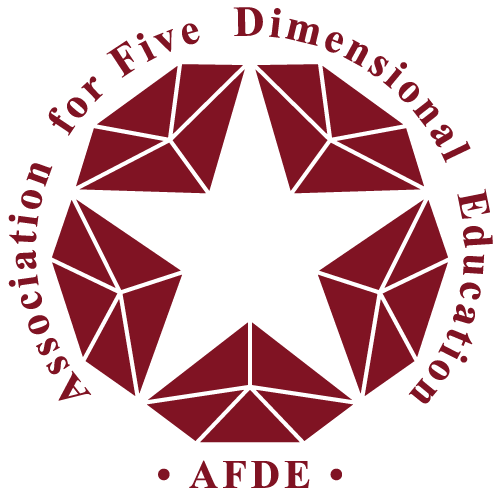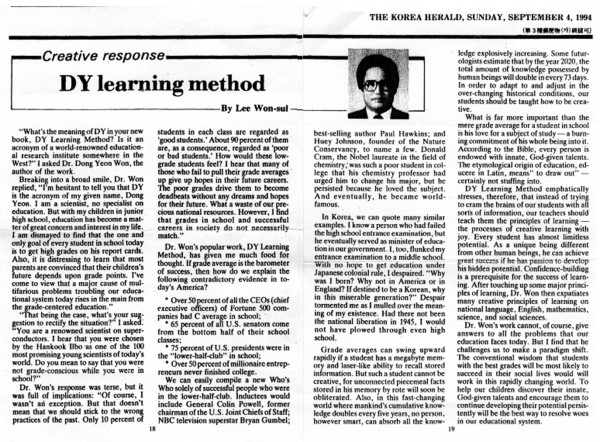헤롤드 신문 " DY learning method "
페이지 정보
작성자 DIA관리자 (222.♡.50.29) 댓글 0건 조회 2,311회 작성일 22-02-17 12:39본문
THE KOREA HERALD, SUNDAY, SEPTEMBER 4, 1994
-Creative response.
DY learning method
-By Lee Won-sul
"What's the meaning of DY in your new book, DY Learning Method? Is it an acronym of a world-renowned educational rescarch institute somewhere in the West?" I asked Dr. Dong Yeon Won, the author of the work.
Breaking into a broad smile, Dr. Won replied, "I'm hesitant to tell you that DY is the acronym of my given name, Dong Yeon. I am a scientist, no specialist on education. But with my children in junior high school, education has become a matter of great concern and interest in my life. I am dismayed to find that the one and only goal of every student in school today is to get high grades on his report cards. Also, it is distressing to learn that most parents are convinced that their children's future depends upon grade points. I've come to view that a major cause of multifarious problems troubling our educational system today rises in the main from the grade-centered education."
"That being the case, what's your suggestion to rectify the situation?" I asked: "You are a renowned scientist on superconductors. I hear that you were chosen by the Hankook Ilbo as one of the 100 most promising young scientists of today's world. Do you mean to say that you were not grade-conscious while you were in school?"
Dr. Won's response was terse, but it was full of implications: "Of course, I wasn't an exception. But that doesn't mean that we should stick to the wrong practices of the past. Only 10 percent of students in each class are regarded as 'good students.' About 90 percent of them are, as a consequence, regarded as 'poor or bad students. How would these lowgrade students feel? I hear that many of those who fail to pull their grade averages up give up hopes in their future careers. The poor grades drive them to become deadbeats without any dreams and hopes for their future. What a waste of our precious national resources. However, 1 find that grades in school and successful careers in society do not necessarily match."
Dr. Won's popular work, DY Learning Method, has given me much food for thought. If grade average is the barometer of success, then how do we explain the following contradictory evidence in today's America?
* Over 50 percent of all the CEOs (chief executive officers) of Fortune 500 companies had C average in school;
* 65 percent of all U.S. senators come from the bottom half of their school classes;
* 75 percent of U.S. presidents were in the "lower-half-club" in school;
* Over 50 percent of millionaire entrepreneurs never finished college.
We can easily compile a new Who's Who solely of successful people who were in the lower-half-club. Inductees would include General Colin Powell, former chairman of the U.S. Joint Chiefs of Staff; NBC television superstar Bryan Gumbel;
best-selling author Paul Hawkins; and Huey Johnson, founder of the Nature Conservancy, to name a few. Donald Cram, the Nobel laurcate in the field of chemistry, was such a poor student in col- lege that his chemistry professor bad urged him to change his major, but he persisted because he loved the subject. And eventually, he became world- famous.
In Korea, we can quote many similar examples. I know a person who had failed the high school entrance examination, but he eventually served as minister of education in our government. I. too, flunked my entrance examination to a middle school. With no hope to get education under Japanese colonial rule, I despaired. Why was I born? Why not in America or in England? If destined to be a Korean, why in this miserable generation?" Despair tormented me as I mulled over the meaning of my existence. Had there not been the national liberation in 1945, I would not have plowed through even high school.
Grade averages can swing upward rapidly if a student has a megabyte mem- ory and laser-like ability to recall stored information. But such a student cannot be creative, for unconnected piecemeal facts stored in his memory by rote will soon be obliterated. Also, in this fast-changing world where mankind's cumulative know- ledge doubles every five years, no person, however smart, can absorb all the knowledge explosively increasing. Some futurologists estimate that by the year 2020, the total amount of knowledge possessed by human beings will double in every 73 days. In order to adapt to and adjust in the over-changing historical conditions, our students should be taught how to be creative.
What is far more important than the mere grade average for a student in school is his love for a subject of study-a burning commitment of his whole being into it. According to the Bible, every person is endowed with innate, God-given talents. The etymological origin of education, educere in Latin, means" to draw out" certainly not stuffing into.
DY Learning Method cmphatically stresses, therefore, that instead of trying to cram the brains of our students with all sorts of information, our teachers should teach them the principles of learning the processes of creative learning with joy. Every student has almost limitless potential. As a unique being different from other human beings, he can achieve great success if he has passion to develop his hidden potential. Confidence-buildiog is a prerequisite for the success of learn. ing. After touching up some major principles of learning, Dr. Won then expatiates many creative principles of learning on national language, English, mathematics, science, and social sciences.
Dr. Won's work cannot, of course, give answers to all the problems that our education faces today. But I find that he challenges us to make a paradigm shift. The conventional wisdom that students with the best grades will be most likely to succeed in their social lives would will work in this rapidly changing world. To help our children discover their innate. God-given talents and encourage them to continue developing their potential persistently will be the best way to resolve woes in our educational system.
THE KOREA HERALD, SUNDAY, SEPTEMBER 4, 1994
댓글목록
등록된 댓글이 없습니다.

